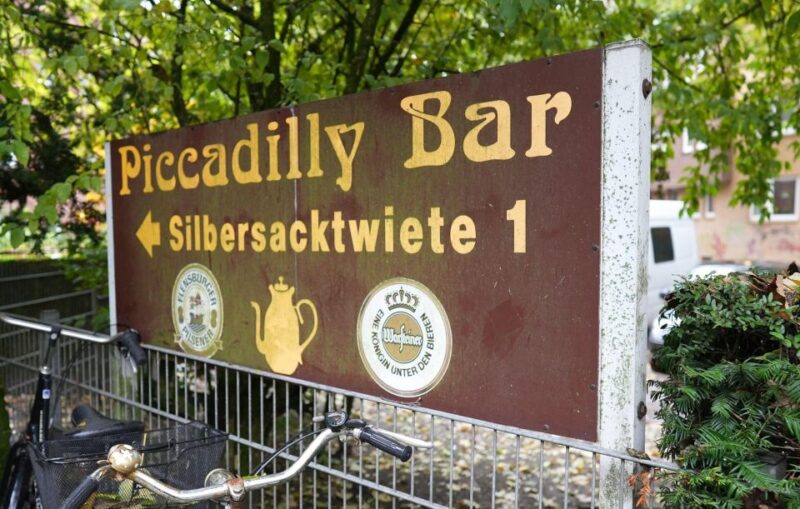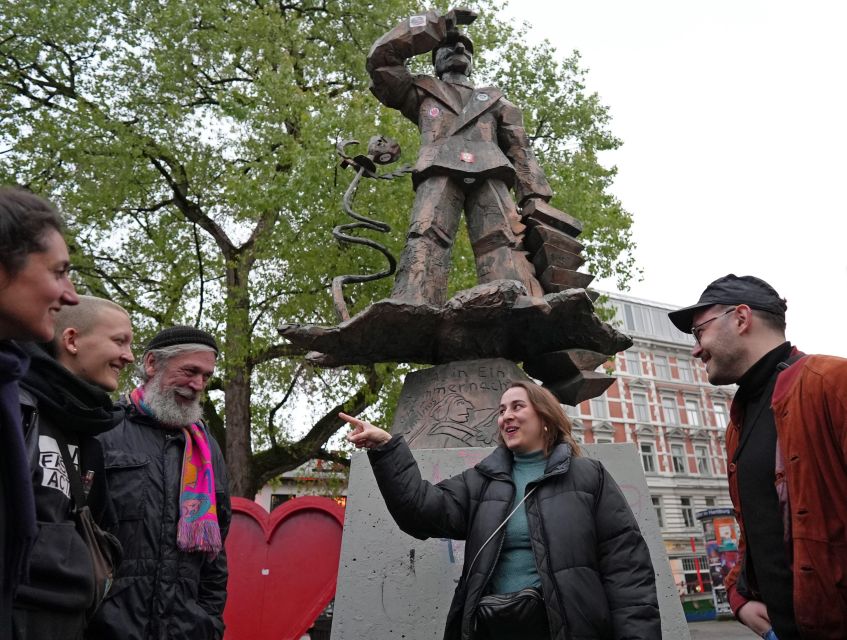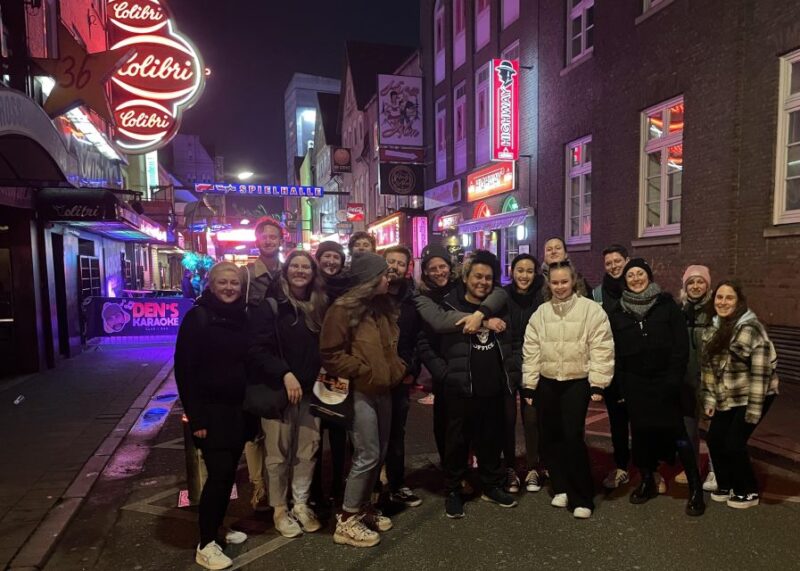The St. Pauli Queertour offers a captivating exploration of the LGBTQI+ community’s rich history and ongoing legacy within Hamburg’s vibrant St. Pauli district. Over the course of a hundred years, this iconic neighborhood has witnessed the emergence of legendary cabarets, alternative clubs, and trailblazing individuals who have shaped queer nightlife and culture. Join this personalized tour to uncover the stories behind these significant locations and learn about the notable figures that have fought for LGBTQI+ rights and expression. With intimate group sizes and a focus on fostering discussion, you will gain a deeper understanding of St. Pauli’s enduring role as a hub for the city’s queer community.
Key Points

- The St. Pauli Queertour explores the LGBTQI+ culture and history of the St. Pauli neighborhood, highlighting notable figures and significant locations over the past century.
- The tour features underground clubs, historic bars, and community centers that have shaped the vibrant queer nightlife and activism in St. Pauli.
- Guides share engaging discussions and personalized stories, allowing for intimate exploration and greater interaction with participants.
- The tour offers a flexible reservation system with a ‘reserve now, pay later’ option and is accessible for wheelchair users.
- The tour starts at the St. Pauli Office counter, where participants complete the registration process and receive necessary materials and instructions.
Explore Queer Life in St. Pauli

The St. Pauli Queertour explores the vibrant queer life of this unconventional Hamburg suburb, offering insights into its rich LGBTQI+ culture and history.
Participants will discover the stories of notable figures like Pauline Courage, a pioneering activist, and Corny Littmann, who founded Germany’s first gay theater.
The tour also visits significant locations that have shaped the neighborhood’s queer nightlife culture over the past century.
From underground clubs to historic bars, the tour provides a unique glimpse into how St. Pauli has become a hub for LGBTQI+ expression and community.
You can also read our reviews of more tours and experiences in Hamburg.
Notable Figures of the Neighborhood

Prominent figures who’ve shaped St. Pauli’s queer history include Pauline Courage, a pioneering LGBTQI+ activist, and Corny Littmann, the founder of Germany’s first gay theater.
Other notable individuals include:
-
Anita Berber, a flamboyant cabaret performer and dancer who captivated audiences in the 1920s with her provocative performances.
-
Rosa von Praunheim, a filmmaker and activist who played a crucial role in the German gay rights movement.
-
Hedi Höpfner, a lesbian journalist and publisher who advocated for LGBTQI+ visibility and equality.
-
Ricky Echolette, a renowned drag queen and icon of the St. Pauli nightlife scene.
-
Klaus Wowereit, the former mayor of Berlin, who openly embraced his sexuality and championed LGBTQI+ rights.
Queer Nightlife Culture Through the Years

St. Pauli’s queer nightlife culture has evolved dramatically over the past century, reflecting the neighborhood’s enduring reputation as a hub of unconventionality and LGBTQI+ expression. From the early 1900s, when drag shows and queer cabarets flourished, to the post-war era when venues like the Ruperta and Revue Alhambra became icons of St. Pauli’s vibrant nightlife, the area has witnessed the highs and lows of queer visibility. In recent decades, the neighborhood has seen a resurgence of LGBTQI+ spaces, with establishments like the iconic L’Escalier and contemporary hotspots like the Wohlgemut championing inclusivity and progressivism. Through it all, St. Pauli’s queer nightlife has remained a defiant symbol of resilience and self-expression.
| Decade | Notable Venues | Cultural Significance |
|---|---|---|
| 1910s | Cabaret Ruperta, Revue Alhambra | Emergence of drag shows and queer cabarets |
| 1940s | Ruperta, Revue Alhambra | Icons of the post-war queer nightlife scene |
| 1980s | L’Escalier | Championing LGBTQI+ inclusivity and progressivism |
| 2000s | Wohlgemut | Contemporary hotspots reflecting the neighborhood’s vibrant queer culture |
| 2020s | Diverse range of LGBTQI+ venues | Continued evolution and resilience of St. Pauli’s queer nightlife |
Significant Locations on the Tour
Dotting the landscape of St. Pauli’s queer history are several locations that have played pivotal roles in shaping the neighborhood’s vibrant LGBTQI+ nightlife culture over the decades.
Among the significant sites on the St. Pauli Queertour are:
-
The Zum Silbersack, a legendary cabaret that hosted groundbreaking performances by icons like Anita Berber in the 1920s.
-
The Golden Pudel Club, a beloved venue that has been a hub for alternative queer expression since the 1980s.
-
The Centro Sociale, a community center that has provided a safe space for LGBTQI+ activism and events.
-
The Große Freiheit, a bustling street known for its diverse array of queer bars and clubs.
-
The Zum Alten Heine, a historic bar that has borne witness to the neighborhood’s evolving queer culture.
Personalized Experience for Small Groups
By keeping group sizes small, the St. Pauli Queertour provides a more personalized and intimate experience for guests to explore the neighborhood’s rich LGBTQI+ heritage.
Tour-goers can expect to engage in lively discussions with their local guide, who’ll share nuanced stories and insights about the community’s vibrant past and present.
The small group setting allows for greater interaction, where participants can ask questions, share their own experiences, and gain a deeper understanding of the significance of the landmarks and figures highlighted along the way.
This personalized approach ensures that each tour is tailored to the interests and curiosities of the group, creating a truly immersive and memorable exploration of 100 years of queer pride in St. Pauli.
- The Local Tour of Hamburg Historic Centre
- Guided Hamburg City Bike Tour
- Private Small-Group Hamburg City Tour With a Luxury Vehicle
- Treasure Hunt Through Hamburg’s HafenCity
- Hamburg Small-Group Sunset Sailing Cruise on Lake Alster
- St. Pauli Neighborhood Tour – in the Heart of the Reeperbahn (German-Speaking Only)
Reserve Now and Pay Later Option
Travelers can take advantage of the reserve now & pay later option, which allows them to secure their spot on the St. Pauli Queertour without needing to pay upfront. This flexible booking method gives participants the freedom to finalize their travel plans closer to the tour date, making it easier to accommodate unexpected schedule changes or last-minute decisions.
By reserving their spot in advance, tour-goers can ensure availability for their preferred tour time while deferring the payment until closer to the experience.
The reserve now & pay later option offers several benefits:
-
No upfront payment required to reserve your spot
-
Flexibility to adjust travel plans closer to the tour date
-
Guaranteed availability for your preferred tour time
-
Convenient payment method to fit your budget
-
Easy cancellation with a full refund up to 24 hours in advance
Accessibility for Wheelchair Users
The St. Pauli Queertour is wheelchair accessible, accommodating those with mobility needs and ensuring an inclusive experience for all participants.
The tour route and venues visited have been carefully selected to provide smooth navigation and access for wheelchair users.
Tour guides are trained to assist participants as needed and ensure the tour is tailored to meet the accessibility requirements of the group.
Visitors can feel confident that they’ll be able to fully engage with the rich LGBTQI+ history and culture of St. Pauli without any barriers.
This commitment to accessibility reflects the tour’s broader mission of celebrating diversity and creating a welcoming environment for people of all backgrounds.
Meeting Point and Registration Instructions
Participants should register for the St. Pauli Queertour at the counter in the St. Pauli Office, which serves as the meeting point for the tour. This ensures a smooth start to the 2-hour experience exploring 100 years of queer history in the unconventional suburb.
Some key things to note:
-
Arrive at the meeting point a few minutes early to complete the registration process.
-
Present your booking confirmation or digital ticket to the staff at the counter.
-
Inform the staff of any special requirements, such as accessibility needs.
-
Review any last-minute tour details or changes with the staff.
-
Receive any necessary materials or instructions before the tour begins.
Frequently Asked Questions
What Is the Tour’s Average Group Size?
The tour’s group size is described as small, providing a more personalized experience for participants. The tour’s inclusions indicate a focus on offering a guided walking tour led by local guides in a intimate setting.
Are Food and Drinks Available During the Tour?
Yes, the tour includes food and drinks for participants. According to the tour information, the inclusions cover a guided walking tour led by local guides, with food and drinks provided throughout the experience.
Are Audio Guides or Headsets Provided on the Tour?
The tour doesn’t provide audio guides or headsets. Instead, it features a guided walking tour led by local tour guides, allowing for a more personal and interactive experience exploring the area’s queer history and culture.
Do the Tour Guides Speak Any Languages Besides German?
The tour guides for this walking tour primarily speak German. However, they may be able to accommodate other languages upon request, depending on the availability of multilingual guides. It’s best to check with the tour operator in advance about language options.
Is the Tour Suitable for Children or Families?
The tour doesn’t seem suitable for children or families as it focuses on exploring queer nightlife culture and notable LGBTQI+ figures in the area. It’s likely best suited for adult, LGBTQI+-friendly audiences.
Recap
The St. Pauli Queertour offers a unique opportunity to explore the rich LGBTQI+ history and culture of Hamburg’s iconic St. Pauli district.
From legendary cabarets to alternative clubs, the tour showcases significant locations and notable figures, fostering intimate discussions and celebrating the ongoing evolution of queer expression in this vibrant neighborhood.
Whether you’re a local or a visitor, this personalized experience isn’t to be missed.
You can check if your dates are available here:More Tour Reviews in Hamburg
Not for you? Here's more things to do in Hamburg we have recnetly reviewed
- 2 Best Craft Beer Tours And Tastings In Hamburg
- 2 Best Shopping Tours In Hamburg
- 25 Best Cruises And Boat Tours In Hamburg
- 10 Best Food Tours In Hamburg
- Hamburg : Private Custom Walking Tour With A Guide (Private Tour)
- Canal Trip – Discover the Different Faces of the City!
- Private Shopping Tour From Hamburg to Designer Outlet Neumünster
- Hamburg Hotels to Ostseekai Kiel Cruise Port – Departure Private Transfer
- Hamburg Old Town Highlights Private Walking Tour
- City Game Scavenger Hunt Hamburg City Center – Independent City Tour
- Private Transfer From HAMburg to HAMburg Airport HAM Departure
- Hamburg Airport Transfers : Hamburg to Hamburg Airport XFW in Luxury Van
